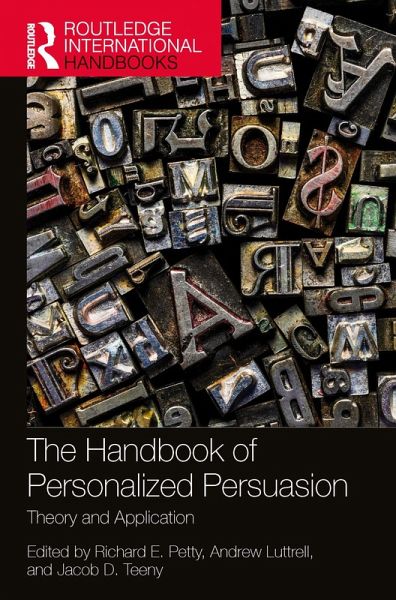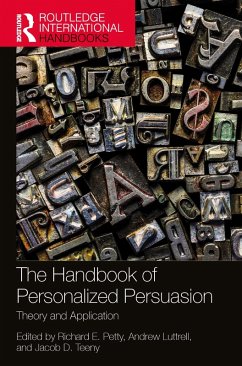
The Handbook of Personalized Persuasion (eBook, ePUB)
Theory and Application
Redaktion: Petty, Richard E.; Teeny, Jacob D.; Luttrell, Andrew
Versandkostenfrei!
Sofort per Download lieferbar
43,95 €
inkl. MwSt.
Weitere Ausgaben:

PAYBACK Punkte
22 °P sammeln!
The Handbook of Personalized Persuasion provides the most comprehensive and state-of-the-art review of the expansive literature on personalized messaging in persuasion.The book describes what features of people, messages, and contexts are most effective for personally tailored communication, and how this knowledge can be leveraged to improve the influence of messaging in any domain. It also addresses when such personalization can be counterproductive or backfire. Bringing together some of the foremost experts in the area, the book consists of a diverse, global, and interdisciplinary set of sch...
The Handbook of Personalized Persuasion provides the most comprehensive and state-of-the-art review of the expansive literature on personalized messaging in persuasion.
The book describes what features of people, messages, and contexts are most effective for personally tailored communication, and how this knowledge can be leveraged to improve the influence of messaging in any domain. It also addresses when such personalization can be counterproductive or backfire. Bringing together some of the foremost experts in the area, the book consists of a diverse, global, and interdisciplinary set of scholars who tackle the theory and application of personalized persuasion. Organized into two sections, the first part of this book addresses the many aspects of people to which messages can be targeted, such as the basis of a person's attitude or the person's goals or identity. The second part of this book tackles the many important areas of application in which personalized messaging has been examined, such as political and health messaging, consumer advertising, and even online misinformation.
This handbook is essential reading for researchers and students in social psychology and across the behavioral and social sciences, while also offering practitioners in marketing, government, and beyond the most cutting-edge insights into how to maximize the influence of personalized persuasion.
The book describes what features of people, messages, and contexts are most effective for personally tailored communication, and how this knowledge can be leveraged to improve the influence of messaging in any domain. It also addresses when such personalization can be counterproductive or backfire. Bringing together some of the foremost experts in the area, the book consists of a diverse, global, and interdisciplinary set of scholars who tackle the theory and application of personalized persuasion. Organized into two sections, the first part of this book addresses the many aspects of people to which messages can be targeted, such as the basis of a person's attitude or the person's goals or identity. The second part of this book tackles the many important areas of application in which personalized messaging has been examined, such as political and health messaging, consumer advertising, and even online misinformation.
This handbook is essential reading for researchers and students in social psychology and across the behavioral and social sciences, while also offering practitioners in marketing, government, and beyond the most cutting-edge insights into how to maximize the influence of personalized persuasion.
Dieser Download kann aus rechtlichen Gründen nur mit Rechnungsadresse in A, B, BG, CY, CZ, D, DK, EW, E, FIN, F, GR, HR, H, IRL, I, LT, L, LR, M, NL, PL, P, R, S, SLO, SK ausgeliefert werden.













